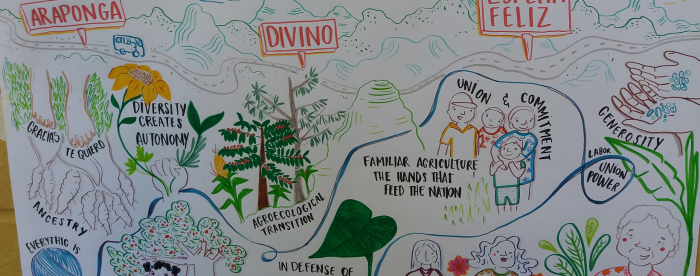Nieuws
Onze verhalen

Suriname - 28 april, 2020
Tropenbos directeur Rudi van Kanten en assistent onderzoeker Bindia-Roy Jaddoe, bezochten de INREF Forefront Workshop in Viçosa en Zona da Mata, Minas Gerais te Brazilië, die duurde van 09-13 Maart 2020.
Tropenbos directeur Rudi van Kanten en assistent onderzoeker Bindia-Roy Jaddoe, bezochten de INREF Forefront Workshop in Viçosa en Zona da Mata, Minas Gerais te Brazilië, die duurde van 09-13 maart 2020. De workshop was sterk gekoppeld aan agro-ecologie en de consumptie bestond op enkele uitzonderingen na, alleen uit agro-ecologische gerechten. Agro-ecologie is een vorm van landbouw waarbij geen agro-chemicaliën worden gebruikt en waar een nauwe verbondenheid met moeder aarde, tradities en cultuur van de bewoners aanwezig is. Zona da Mata heeft een sterke Afro-Braziliaanse cultuur.
Op de eerste dag werd de workshop gehouden in het CEE (Centre for Education and Extension (CEE) op de Federale Universiteit van Viçosa (UFV). Er werden 33 participanten geïntroduceerd en presentaties werden verzorgd door de INREF partners van Wageningen Universiteit (WUR), UFV, de Universiteit van Mexico - Universidad Autónomo de Mexico (UNAM), ECOSUR (Mexico), Tropenbos International (TBI) en Tropenbos Suriname (TBS).
In de onderzoeksgebieden van Brazilië (Zona da Mata – Minas Gerais) en Mexico (La Sepultura and Marques de Comilla) hebben 10 PhD studenten en hun begeleiders in nauwe samenwerking met boeren verenigingen, actief onderzoek verricht. Dit is ook de reden waarom de workshopsessies op dag 2 en 4 zijn gehouden in het Centrum voor Agro Ecologische Technologie (Centro de Tecnologías Agro-ecológicas (CTA), een agro-ecologische groep welke in 1987 is opgezet door studenten van de UFV.
Tijdens de sessies is gebruik gemaakt van de ‘fish bowl' methode (Fig 1). Dit is een manier van dialoog waarbij zes stoelen in een cirkel worden geplaatst en vijf bezet zijn. De discussie vangt aan en op het moment dat iemand op de zesde stoel plaatsneemt, moet een van de andere vijf stoelen vrij gemaakt worden. Hierdoor is er continu rotatie van de deelnemers aan de dialoog.
Op de 3e dag werden de participanten in drie groepen verdeeld waarbij elke groep een veldbezoek bracht aan één van de drie locaties namelijk: Araponga, Divino en Espera Feliz.
Divino veldbezoek
De groep van Rudi van Kanten, bezocht een agro-ecologische boerderij van zes hectare die behoort aan Adriano en Renata, beiden in de dertig. De boerderij ligt in een heuvelachtige omgeving waar koffie productie het hoofd middel van bestaan is. Voorheen was de grond aangetast en werd er weinig geproduceerd. Er zijn verschillende boomsoorten over het gebied verspreid en andere gewassen zoals maïs, bonen en bananen. Op de boerderij zijn er ook koeien, varkens en kippen waarvan hun voer op de boerderij wordt geproduceerd. De groep bracht ook een bezoek aan een kleine Agro-ecologische ‘boerenmarkt’ waar boeren hun producten in vier verkoopstands op het hoofdplein van het dorp, te koop aanbieden. Hierna was er een ontmoeting met vier vertegenwoordigers van de Unie van Landloze arbeiders: boeren die voorheen als pachtboeren werkten (60% voor de landeigenaar en 40% voor de arbeider) en nu op hun eigen kostgronden van ongeveer 48 hectare werken. Eén van de bedreigingen voor dit gebied is de overweging van de overheid om een Bauxiet mijnbouw bedrijf toe te laten.
Espera Feliz veldbezoek
De groep van Bindia Jaddoe bezocht COOFELIZ, een actieve landbouw coöperatie van familie boeren. Deze coöperatie is opgericht op 27 maart 2006 en beslaat de gemeenten van Espera Feliz, Caiana, Caparaó, en Alto Caparaó, in de bergen van Minas Gerais.
De gemeenschap heeft geen traditioneel gezag, ze zijn Katholiek en geloof in de natuur wordt ook erkent in hun religie. Elke dag is voor hun een dag van de vrouw. De lokale gemeenschap houdt de participatie van de vrouwen in hun omgeving ook in de gaten.
Over het algemeen was het project minder geconcentreerd op het beïnvloeden van beleidsmakers, hoewel dit een gebied is waar het TBI netwerk kan bijdragen aan mogelijke toekomstige samenwerking. Gezien de aard van het project, was de focus gericht op actief onderzoek. Het is raadzaam om na te denken over hoe de onderzoeksresultaten vertaald kunnen worden naar de realiteit van de boeren. Methoden zoals de artistieke pedagogische installaties, de grafische rapportage en de ‘fishbowl’ methode zijn sterke instrumenten.
Agro-ecologische principes bieden goede oplossingen voor de huidige realiteit om daar waar nodig de lokale consumptie én de lokale economie te ondersteunen, maar dit vereist sterke toewijding van boeren, technici en consumenten.